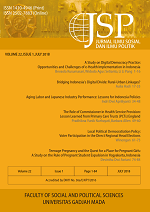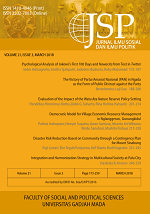Power Network of Penghulu Adat in The Concurrent Regional Election in West Sumatera
Asrinaldi Asrinaldi(1*)
(1) Lecturer of Political Science, Faculty of Social and Political Sciences, Andalas University
(*) Corresponding Author
Abstract
This article describes the power network of Minangkabau’s penghulu adat in West Sumatera. As known in West Sumatera, the penghulu has a strategic position in the Minangkabau community. Its position in traditional institutions is of utmost importance, especially in bridging the interests of the community in the political and governance processes in the nagari. This is deemed feasible as penghulu adat is capable of optimizing their power network and utilizing traditional institutions that they congregate in. In explaining the power network of penghulu, this study used a descriptive type of qualitative approach. Furthermore, this research found various types of formation in penghulu’s power network which serves as the basis for their involvement in the political process of the village. Firstly, the establishment of penghulu power networking through personal capabilities recognized by the community in the village. Secondly, the establishment of penghulu power networking through traditional authority. Thirdly, the establishment of penghulu power networking which originates from the additional legitimacy of local governments, particularly for penghulu considered to represent the local government’s interests in the village. Fourthly, the establishment of penghulu power networking based on the recognition of their peers by bestowing the title of sangsako in the tribe.
Keywords
Full Text:
PDFReferences
Abdullah, T. (2009). Indonesia Towards Democracy. Singapore: ISEAS Publishing.
Aspinall, E., & Sukmajati, M. (2016). Electoral Dynamics in Indonesia: Money Politics, Patronage and Clientelism at the Grassroots. In E. Aspinall & M. Sukmajati (Eds.), Patronage and Clientelism in Indonesia Election Politics (pp. 1-38).
Singapore: NUS Press.
Asrinaldi. (2016). Masalah Keterlibatan Aparatus Sipil Negara dalam Pilkada, Analisis CSIS, 45(1):58-76.
Asrinaldi. (2016). Politik Kekuasaan Penghulu Adat dan Implikasinya Pada Kualitas Demokrasi Lokal di Sumatera Barat. Padang: LPPM Universitas Andalas.
Biezefeld, R. (2007). The Many Roles of Adat in West Sumatra. In Jamie S. Davidson & David Henley (Eds.), The Revival of Tradition in Indonesian Politics: The Deployment of Adat from Colonialism to Indigenism (pp. 203-223). New York:
Routledge.
Cohen, A. (2004). Customs and Politics in Urban Africa: A Study of Hausa Migrants in Yoruba Towns. Oxon: Routledge.
Foucault, M. (1982). The Subject and Power. Critical Inquiry, 8(4), pp. 777-795.
Graves, Elizabeth E. (2010). The Minangkabau Response to Dutch Colonial Rule in the Nineteenth Century. Singapore: Equinox Publishing.
Hadler, J. (2010). Sengketa Tiada Putus: Matriakat, Reformisme Islam, dan Kolonialisme di Minangkabau. Jakarta: Freedom Institut.
Hakimy, I. (2008). Pegangan Penghulu, Bundo Kanduang, dan Pidato Alua Pasambahan Adat di Minangkabau. Bandung: Remaja Rosdakarya.
Hanif, H. (2009). Politik Klientelisme dan Dilema Demokratisasi di Indonesia. Jurnal Ilmu Sosial dan Ilmu Politik, 12(3), 327-351.
Hughes, D. (2000). Pengaruh Timbal balik Peran Kepemimpinan Tradisional dan Demokrasi di Ponape. In Frank McLynn dan Arthur Tuden (Eds.). Pendekatan Antropologi Pada Perilaku Politik (pp. 382- 403). Jakarta: UI Press.
Jones, S. (2010). The Normalization of Local Politics? Watching the Presidential Elections in Morotai, North Maluku. In Edward Aspinall & Marcus Mietzner (Eds.), Problems on Democratisation in Indonesia: Elections, Institutions
and Society (pp. 330-348). Singapore: ISEAS Publishing.
Navis, A. A. (2015). Alam Takambang Jadi Guru: Adat dan Kebudayaan Minangkabau. Padang: Grafika Jaya Sumbar.
Prasad, K. (2016). Identity Politics and Elections in Malaysia and Indonesia: Ethic Engineering in Borneo. Oxon: Routledge.
Simandjuntak, D. (2013). Beyond Wealth and Pleasant Posture: Exploring Elite Competition in the Patronage Democracy of Indonesia. In J. Abbink & T. Salverda (Eds.), The Anthropology of Elites: Power, Culture, and the Complexities
of Distinction (pp. 95-112). New York: Palgrav e Macmillan.
Sulistiyanto, P., & Erb, M. (2009). Indonesia and Quest for “Democracy”. In M. Erb & P. Sulistiyanto (Eds.), Deepening Democracy in Indonesia: Direct Elections for Local Leaders (Pilkada) (pp. 1-37). Singapore: ISEAS.
Tronvoll, K., & Hagmann, T. (2012). Introduction: Traditional Authorities and Multi-Party Elections in Ethiopia. In K. Tronvoll & T. Hagmann (Eds.), Contested Power in Ethiopia: Traditional Auhorities And Multi-party Elections (pp.1-30).
Leiden: Koninklijke Brill, NV.
Vel, Jacqueline A.C. (2008). Uma Politics: An Ethnography of Democratization in West Sumba, Indonesia, 1986-2006. Leiden: KITLV Press.
Von Benda-Beckmann, F. & Von Benda- Beckman, K. (2013). Political and legal Transformations of An Indonesian Polity: The Nagari from Colonisation to Decentralisation. Cambridge: Cambridge University Press.
Wang, G. (2014). Tamed Village “Democracy”: Elections Governance and Clientelism in Contemporary Chinese Village. London: Springer-Verlag.
Weber, M. (1947). The Theory of Social and Economic Organization. Glencoe, Illinois: The Free Press.
Article Metrics
Refbacks
- There are currently no refbacks.
Copyright (c) 2017 Jurnal Ilmu Sosial dan Ilmu Politik

This work is licensed under a Creative Commons Attribution-NonCommercial-NoDerivatives 4.0 International License.






















